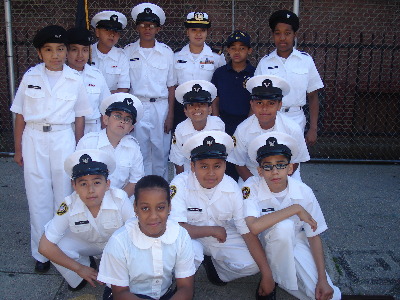
Private First Class Jose Peralta stopped smiling. He looked straight into me and answered the unsettling question about war, "I would go to Iraq if they asked me." His chubby companion, PFC Garcia, and his female companion, PFC Juarez, nodded soberly in agreement while their immigrant parents smiled politely. Their radiant brown hands and faces glowed against their starched straight white uniforms. But, instead of drawing the usual looks of admiration from onlookers, their regalia - shiny black shoes, tight white slacks and white hats and white shirts colored with shiny medals - drew stares of disgust on the Manhattan-bound D train. Riding from the working class immigrant part of Brooklyn near the Navy Yard to Union Square, the historic center of peace marches in Manhattan since the end of the Civil War, they didn't seem to let the stares distract them. They are committed; they are proud members of the Coastal Patrol Cadet Corps (CPCC); they are ten years old.
PFC Peralta and his fellow cadets are but a few of the thousands of Latino children targeted for early indoctrination into the military by programs designed for the very young. The Coastal Patrol Cadet Corps website states clear goals: "Our activities are designed to build upstanding Americans, with physical and mental stamina, discipline and obedience. Instructions are given in numerous categories, including military discipline, leadership, infantry drill, rifle drill, seamanship, navigation, first-aid, communications, boat handling, drum, bugle and band instruments."
I asked PFC Peralta if he knew anything about the Latino PBS The War controversy raging across the country. "No. I don't know nothing about that," said the bright-eyed son of immigrants from Puebla, Mexico. But he had, he told me, already made up his mind about the military: "I'm gonna be the Captain of a navy ship."
I thought about that earlier encounter with PFC Peralta and his crew as I watched Ken Burns' War documentary Sunday evening. The 14 and a half our epic was as much about the current and future PFC Peralta's as it was about the septuagenarians and octogenarians featured in the film. The controversy around whether and how to include Latinos should matter to all as should the issues around artistic license.
One can only the imagine the agony Burns experienced as he was forced to correct his Latino oversight with scenes a reviewer at the New Yorker magazine said had a "tacked-on" feel to them. Placed at the very last ten minutes of the first episode, the East LA accents and bolero music of the Latino interviews do, in fact, make those characters and stories seem completely foreign to the small town USA stories at the heart of the first two hours and the entire epic.
More than the actual film, the controversy around the film will have done more to educate the country about the more than 500,000 Latinos who enlisted, fought or died during World War II. Premiering during a historical moment of unprecedented anti-immigrant, anti-Latino sentiment, The War's "Oh-yeah,-Latinos-fought-too" feel will not inspire future PFC Peralta's to enlist. Viewed from the perspective of peace activists, Burns' jerky editing of Latinos into history (ie; even his Southwestern US-focused The West documentary included only 2 Latino characters out of a cast of 80) may actually be a good thing.
Those who depend on war and those who advocate peace know that future wars and the future of the US military itself depends on the decisions of young Latinos like Peralta. As Larry Korb, former Assistant Secretary of Defense for Manpower, Reserve Affairs, Installations and Logistics in the Reagan Administration Defense Department, once told me, "Latinos are very important to the national security of the United States," adding that, "A decrease in Latino enlistment numbers would make things very difficult for the armed forces, because they are the fastest-growing [minority] group in the country and they have a very distinguished record of service in the military." If he were Secretary of Defense, Korb, would "be very worried about the possibility of decreasing Latino numbers. I'd be thinking about how to make do with smaller numbers of troops or with further lowering standards for aptitude, age, education and other factors."
Programs like PFC Peralta's CPCC are part of an armada of programs and campaigns linked to or influenced by a Pentagon that needs 22 percent of the Armed Forces to check off "Hispanic" on enlistment forms if it is to meet recruitment and deployment goals by 2025. As if mounting a major offensive on a domestic adversary, the Pentagon is, unlike Burns, paying extremely close attention and spending millions to find out about the world of PFC Peralta: what he wears, where he hangs out, what kinds of groups he belongs to, what he reads, what he watches on TV, his grades, his dreams. Members of the Pentagon's many and well-funded recruiting commands are a permanent feature of urban school systems; programs like the No Child Left Behind guarantee that schools give recruiters PFC Peralta's home phone number, address and other information. Even popular children's restaurant chain Chuck E. Cheese is doing its part to make sure PFC Peralta gets the martial message when he's not at CPCC. Puppet shows at some restaurants include military music and Chuck E. Cheese television has broadcast images of Latinos and others in the Army giving food and supplies to children in Iraq.
Burns failed to fulfill promises to activists that he would "seamlessly" integrate the Latino portions of the film. But his failure will do little to inspire PFC Peralta and other Latino kids to enlist between now and 2025. Hopefully, documentarians of future US wars will lack Latino subjects because there will be fewer PFC Peralta's to film.
Thank you, Ken Burns, for barely including us in your War.